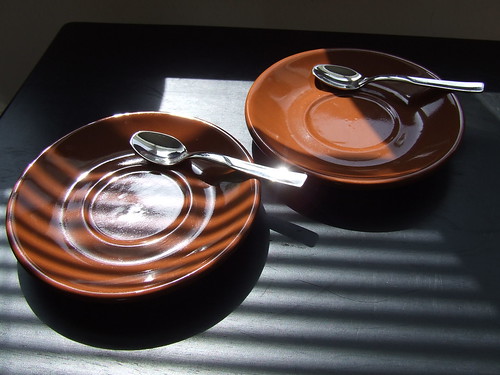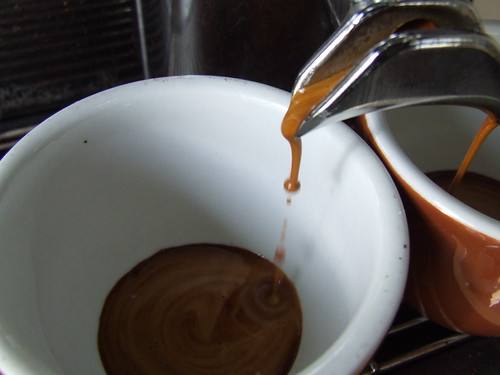It's not as easy as one might think.
Here are my latest attempts at photographic "ars coffea". (that's coffee art)
The beginning stages.
Waiting patiently. 
a bit blurry.
Ran low on milk on the shorter one. (in case it isn't obvious enough)


As photogenic as coffee and espresso are supposed to be, I seem to have a difficult time being satisfied with any shots I get of either.
Tips, pointers, or undeserved praise are welcome. (and encouraged)
Monday, April 28, 2008
Coffee and (amateur) Photography
Wednesday, April 23, 2008
No Man Can Serve Two(or three) Masters
Time and time again, when I talk to people about coffee business strategy it seems the top priority is speed. "I want the customer to be able to be in and out in 90 seconds or less," and the like seem to have somehow become the goal to strive for in regards to customer service.
Fine. Good. Quick service is hard to look down on, but is that all there is to it? Of course not!
Now, don't get me wrong. I'm not saying that speed isn't a noble practice. I'm saying that it shouldn't take a back seat to quality.
I know, I know. This is said time and time again. "The horse is not only dead, it ceases to exist." Yes, right. I know. Hear me out.
You have to start with one or the other. Yeah, sure, you can have fast quality, but they are never equals. I don't care what the business plan or mission statement says. I don't care what the manager or CEO says. They are NEVER equals.
Imagine, if you will, a store that wants to franchise. They want to serve the best quality possible. For this reason, they are installing super automatic espresso machines. Counter-intuitive? Why? This means that service will be fast, and the quality will be consistent.. right?
Well... yes and no. Already, we've seen another variable enter into the equation. Consistency.
So now we have to choose between: Speed. Quality. Consistency.
Yes, those three little words that are cause for much planning, much strategy, and much debate over their importance.
The thing is, people always say, "well, they're all important", and the more advanced version, "Quality is the most important, but the others are definitely high on our list." That last one sounds great... on paper.
The problem is that too many times people will say things like that, but when push comes to shove, if there is a bottleneck line out the door, and the shot didn't come out quite right, a lot of people will serve it anyway. It'll be covered in milk anyway, right?
Herein lies the dilemma. We need more than a mantra. We need more than a concept. We need a philosophical framework for how to implement these words accurately and correctly in a cognitive manner.
Actions follow thought, so in order to perform right action, we must first practice right thought. As we've already seen, words tend to be kind of cheap. Mantras and slogans show their age and get stale. They are impermanent solutions to a fundamental philosophical problem within our industry as a whole.
As it is, time and time again I hear and preach that one should focus on a few things, and do those few things well. Time and time again, the word comes up with great emphasis. Focus.
Just as we must crawl before we can walk (and walk before we can run), we must begin begin by focusing on only one element before we can learn to successfully implement the others.
I propose the same thing than any reader of this blog would state to be their primary focus of the three priorities listed. Focus on Quality.
Start by perfecting espresso preparation and milk frothing techniques. Back to basics. Practice. Taste. Analyze. Troubleshoot. Repeat. Do this time and time again until the analysis yields consistent results, and troubleshooting becomes unnecessary.
And there, we've made our first adaptational merger of priorities. We began with quality. Now, we have adapted consistency to the primary objective.
They are not equals. Consistency is an add on. Like a six-speed transmission on a base model coupe.
It's nice, but not the core of what you intend.
Now that the fundamental skill set is in place, how do we beat the clock to get from point A to point B in our slightly improved automobile? We speed it up.
Now, speeding things up doesn't mean dropping the transmission. You certainly can't speed up with no fundamental with which to increase your speed. If you sacrifice the primary objective, the entire structure falls apart, and we are no longer in the upper echelon of product prestige.
Imagine the quickness not as a physical speed, but as an efficiency. We're going to replace the conventional oil with full-on synthetic. We're going to replace the air filter for easier breathing(inhale). We're going to use some GM Syncromesh in the gearbox, and we're going to (slightly) increase the diameter of our exhaust tubing, again, for easier breathing (exhale).
We have not added anything. We have only removed obstacles that make existing power more easily accessible. We haven't sped things up. We've only made the work flow more efficient. The result, as the car will attest to, is better efficiency, and more speed(power).
"Work smarter, not harder".. again. We don't need mantras. However, if you were to take the analogy just given and condense it into one sentence, that would be it. I just feel that such verbalizations are too general and really don't drive the point home effectively enough.
So now we have adapted NOTHING to our Primary Objective other than consistency(from earlier). We've just streamlined the operations a bit. Simple. This is not in the hands of the barista. This is in the hands of the general manager, bar manager, shop owner, whoever is solely responsible for the general layout of things behind the bar.
Now that everything is primed, this little sporty coupe is ready to hit the Autobahn.
It doesn't take much effort to speed things up a bit at this point. If it's truly challenging, then I would suspect that you didn't succeed in optimizing your work station's work flow efficiency.
(Maybe you used the wrong sized exhaust tubing. Maybe your air filter is dirty. Maybe you're still trying to cheap out by using conventional oil.)
In skilled hands, speeding up the pace means just doing the normal tasks in a slightly accelerated pace. Generally, this is more related to efficiency than actual velocity and acceleration of physical movements.
And thus, we have adapted Speed to the Primary Objective.
If you'll notice, neither consistency nor speed will stand on their own if quality truly is the high priority. Both are merely an adaptation to what is already present: a concentrated and intense focus on quality.
But if a bad shot is pulled, you don't ditch the foundation. You don't throw away the car. You throw away the offensive shot and start over. Just like making a U-turn under the highway overpass.
Think of it as a molecule. Quality has a couple of smaller atoms. The first one is consistency. Consistency has a smaller atom attached to it as well. It's called speed.
It's good to be back.



